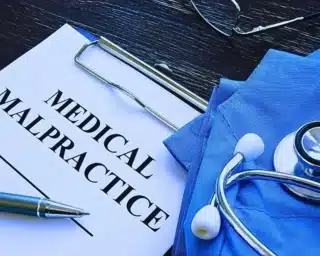If you have suffered harm from a medical provider, you may need to know how to prove medical malpractice to seek compensation. A medical malpractice lawsuit is a complex legal claim compared to other injury-related claims in Nevada. These cases involve intricate legal issues and medical evidence, which can become complicated quickly. It is important for you and your attorney to have a deep understanding of the special procedures and requirements that come into play.
The Four Elements of Negligence
In Nevada, there are four criteria for medical negligence that must be proven to make a successful medical malpractice claim. These are duty, breach, causation, and damages.
Duty of Care
In a negligence case, it is necessary to establish that you were owed a duty of care. This duty arises because of a legal relationship between the defendant and the plaintiff, which requires the defendant to act in a certain manner. In the context of a medical malpractice lawsuit, this legal relationship is established between the doctor and the patient. When you seek medical treatment, you enter a doctor-patient relationship with the medical provider or facility.
All medical providers, including general and nurse practitioners, surgeons, nurses, and specialists, owe a duty of care to their patients. This duty requires the medical provider to provide treatment with the same level of skill and care as a prudent, reasonable, and similarly trained medical professional in the same or similar circumstances. Using this standard, a cardiologist will be compared with other cardiologists, or a nurse will be held to the same standard as other nurse practitioners.
Therefore, if you receive medical treatment from a medical provider, a duty of care is assumed, and they are legally responsible for providing you with treatment that meets the appropriate standard of care.
Breach of Duty
The next step is to show that the medical professional or facility breached the duty of care. A breach of duty of care occurs when a medical provider fails to exercise the same degree of medical skill and care that another medical professional in the same specialty would in a similar situation.
For example, a surgeon who fails to properly sterilize his or her instruments before surgery, resulting in a patient’s infection, would be considered to have breached the established standard of care. Another example is where medication is improperly administered. If your medication is making you sick, it may be a breach of the duty of care.
Causation
It is necessary to prove that the medical professional or facility’s negligence or conduct was the direct cause of a new injury or illness, a worsened health condition, or emotional harm that you experienced. This can be done by demonstrating that your health condition deteriorated or that you suffered an injury due to the medical provider’s negligence or error. You should show that such condition would not have occurred or worsened without the professional’s negligence or error.
You must have suffered an injury or harm. Even if your medical provider or facility has made an error, if you have not suffered any injury or harm, you may not have grounds for a malpractice claim.
Damages
To satisfy the element of damages, you must be able to demonstrate that you suffered measurable harm or injury. This can be physical, mental, emotional, or financial losses. You can use your own testimony, medical records, and expert testimony to establish the extent of your damages.
However, it is important to remember that not every bad or unexpected outcome is the result of professional negligence. Patients often come to healthcare providers with serious medical issues that may be untreatable, or have a low probability of success. For a claim of professional negligence to be viable, there must be expert medical testimony that a specific act or omission by the provider was the direct cause of the bad outcome. Additionally, even if a provider made a serious error, the claim will not be viable if the error did not result in an injury to the patient.
Gathering Evidence for a Medical Malpractice Case in Nevada
Obtaining evidence of medical malpractice can be a challenging task, especially when you’re recovering and don’t know where to start. There are several categories of evidence that can help your case.
Medical Records and Charts
Medical records are one type of evidence that is commonly used. These records consist of various reports, documents, or notes that have been made by doctors and nurses in relation to the incident in question. They may contain details on diagnoses, treatments, changes in medication, progress notes, hospital discharge summaries, and more. Medical records are crucial because they provide an accurate timeline of events leading up to the injury or illness that occurred, as well as any follow-up care provided after the incident.
Expert Testimony
Expert testimony from qualified medical professionals is commonly used to provide evidence. These professionals have expertise in the relevant field related to the case and are asked by attorneys representing plaintiffs to provide their opinion on whether negligence occurred. Their testimony can also include recommendations on what actions should have been taken by clinicians treating the patient involved in the case.
Witness Statements
Testimonies from people who were present during an injury or illness caused by malpractice can be a crucial form of evidence. These individuals may include acquaintances or family members who witnessed the patient before or after the visit to a medical practitioner’s office, or were present when something went wrong during the treatment plan at a hospital or medical facility.
You can keep a journal to record your medical care that begins with a description of your injury and how it occurred. Frequent entries describing the effects of the injury should be included. A pain journal may help your injury case.
Filing a Medical Malpractice Lawsuit in Nevada
If you are intending to file a medical malpractice lawsuit, it is important to know certain important details regarding this type of case in Nevada.
Statute of Limitations
If you want to file a claim based on professional negligence, Nevada law requires you to do so within three years from the date of injury or within one year of discovering the injury, whichever happens first. However, if the provider conceals any act, error, or omission that led to the injury, and they knew or should have known about it, the statute of limitations is put on hold. Therefore, the period of concealment is not counted towards the statute of limitations. Given these relatively short timeframes, it is highly recommended to consult with an attorney immediately upon discovering an injury and suspected negligence.
Pre-Litigation Requirements
In Nevada, any medical malpractice lawsuit that is filed without an affidavit from a medical expert will be dismissed. The affidavit must meet four criteria to be valid:
- It should support the allegations made in the lawsuit.
- It should be submitted by a medical expert who has practiced in an area that is similar to the type of practice at the time of the alleged professional negligence.
- The affidavit must name, identify, or describe by conduct, each medical care provider who is alleged to be negligent.
- It must set forth, clearly and directly, the specific act or acts of alleged negligence for each defendant separately.
If a court dismisses a medical malpractice lawsuit for the failure to file an affidavit of merit, it is considered a “without prejudice” dismissal. The plaintiff can fix the issue by filing an affidavit of merit that complies with Nevada law and proceed with his or her malpractice case.
Hire an Experienced Malpractice Attorney
If you’re pursuing a medical malpractice lawsuit, it’s important to seek the help of a medical malpractice lawyer who understands the complex details involved in such cases. Lawyers with expertise in medical malpractice cases have seen firsthand how substandard medical care can have a negative impact on a person’s life, both in the short and long term. They will use their knowledge to present the severity of your situation to the court.
An experienced attorney can also evaluate key factors of your case, such as the level of harm or injury, quality of life lost, cost of substandard care and follow-up treatment, and loss of income due to harm or injury. An attorney can help you understand the answer to the question, “who can you sue for medical malpractice?” Your lawyer will handle every detail of your case to achieve the best possible outcome.
Without an attorney, you may mishandle your case and miss out on a fair settlement. Partnering with an experienced medical malpractice attorney will safeguard you from mismanaging your lawsuit.
Your lawyer will handle all case-related documents, communicate with others on your behalf, and represent your side to ensure accuracy and strength throughout the legal process. Speaking to insurance companies regarding your medical malpractice case can be daunting. Each insurance representative wants to reach a settlement that benefits their company, not yours.
Your attorney has the experience to speak with insurance representatives and will handle communication on your behalf.




